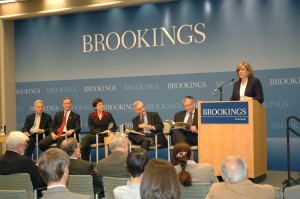A proven bridge-builder, the Baptist Joint Committee works with a wide range of religious and nonreligious organizations in education and advocacy efforts to advance the cause of religious liberty in America. Since colonial times, Baptists have worked in alliance with other believers and nonbelievers alike when we find common cause. The BJC’s coalition work includes efforts to educate the public, file briefs in court cases, support or oppose legislation, and pressure Congress and the administration.
In 2015, the Baptist Joint Committee began its work with other organizations in the Know Your Neighbor coalition, calling on all Americans to share their own beliefs as well as understand and respect those of others. The coalition believes that dialogue is desperately needed to reduce religious tensions and maximize the strength of our nation’s diverse heritage.

BJC General Counsel Holly Hollman introduces a section of “Religious Expression in American Public Life: A Joint Statement of Current Law” at an event at The Brookings Institution. On stage with her are Charles Haynes from the First Amendment Center, Colby May from the American Center for Law and Justice, project leader Meslissa Rogers, syndicated columnist E.J. Dionne, and Marc Stern from the American Jewish Congress.
The BJC also has successfully partnered with groups from various perspectives to explain legal principles and urge their application to common disputes. The BJC was one of the participants in a broad coalition that drafted “Religious Expression in American Public Life: A Joint Statement of Current Law,” answering 35 hot-button questions in 2010. While those on the drafting committee might disagree on how the law should address certain issues, they agree on what the law says and share a conviction that religious liberty is a fundamental right for all people, religious and nonreligious. BJC’s Brent Walker and Holly Hollman both served on the drafting committee, alongside 26 leaders from Jewish, Sikh, Muslim, Catholic, Mormon, Southern Baptist and Seventh-day Adventist groups, as well as from the Christian Legal Society, the ACLU, the American Center for Law and Justice, People for the American Way, and more. The publication is available as an interactive PDF.
Additional examples of consensus statements created to educate the public:
- A Shared Vision: Religious Liberty in the 21st Century (1994, 2002)
- Guidelines for implementing the Equal Access Act (1984)
- Religion in Public Schools: A Joint Statement of Current Law (1995)
Our coalition work includes collaboration efforts to lobby Congress and members of the administration on key issues. Examples include:
- The BJC joined the Anti-Defamation League, the Sikh Coalition, the ACLU, the Becket Fund for Religious Liberty and 16 other national groups to send a letter to the Pentagon in April 2014 asking for improvements on guidance regarding accommodation of religious practices in the Armed Forces.
- The BJC and 55 other members of the National Coalition for Public Education sent a letter to leaders of the Senate Education Committee in June 2013, urging the members to oppose efforts to insert school voucher funding into an education bill. The letter stated, in part, “To both protect the religious freedom of taxpayers and the autonomy of religious schools, many of our coalition members object to taxpayer money being used to fund religious education.”
- The BJC and other members of the Coalition Against Religious Discrimination (CARD) sent a letter to the heads of faith-based offices in 13 federal agencies seeking information on how the Obama administration determines whether religious organizations may discriminate in hiring for government-funded positions in December 2011. The letter came after President Obama issued a 2010 executive order designed to shore up the legal basis of existing federal policy on partnerships between the government and faith-based social service groups. While it made some needed changes, the order did not address the hiring issue. CARD continues to press the administration on this issue.
- BJC Executive Director Brent Walker joined a diverse group of Baptists in 2014 to send a letter to Houston Mayor Annise Parker, reiterating the critical importance of protecting religious liberty and the separation of church and state after her administration sought subpoenas for sermons. Leaders from the Southern Baptist Convention, Cooperative Baptist Fellowship and Baptist General Convention of Texas also signed the letter, which noted that, while the signatories do not agree on everything, the principles of religious liberty are integral parts of Baptist heritage. The subpoenas were later withdrawn.
Visit our legislation page for examples of our coalition work to pass needed legislation and our litigation page for examples of court briefs the BJC created with other groups.




